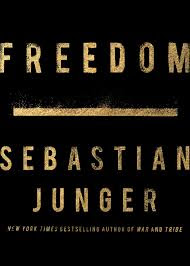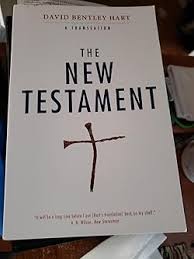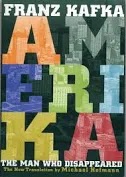More than 40 years ago, I entered the strange world of Franz Kafka in the usual way: reading "The Metamorphosis." This strange story of Gregor Samsa who wakes up having turned in a bug (maybe a cockroach) fascinated me. The story begins with the struggles of a big bug in a Vienna household. Over time his family adapts to his state and eventually continues with their life--the way humans adapt to every sort of horror we face.
In Amerika, the central character, Karl Rossmann arrives in America, abandoned by his family. He begins a series of misadventures that are a descent--some of his problems are of his own making through pride and stubbornness, some are bad luck. But the descent is inexorable.
The story left me feeling pain, both empathy for Karl and for the author. Kafka's life was short, isolated and miserable. Below is a New York Times review of the 2009 translation of Amerika, the one I read. It gives much more context than I could. When I first read Kafka, I thought he would be one of the authors of whom I read all he wrote. That list includes Hannah Arendt, Mark Helprin, CS Lewis, Kazuo Ishiguro, Bernard-Henri Levy, Leo Tolstoy (fiction) but not Kafka. The pain I feel as I read him makes his books a very occasional read (two in 40 years).
America, ‘Amerika’
By Adam Kirsch
Jan. 2, 2009
Most writers take years to become themselves, to transform their preoccupations and inherited mannerisms into a personal style. For Franz Kafka, who was an exception to so many rules of life and literature, it took a single night. On Sunday, Sept. 22, 1912, the day after Yom Kippur, the 29-year-old Kafka sat down at his desk and wrote “The Judgment,” his first masterpiece, in one all-night session. “Only in this way can writing be done,” he exulted, “only with such coherence, with such a complete opening out of the body and the soul.”
Everyone who reads Kafka reads “The Judgment” and the companion story he wrote less than two months later, “The Metamorphosis.” In those stories, we already find the qualities the world would come to know as “Kafkaesque”: the nonchalant intrusion of the bizarre and horrible into everyday life, the subjection of ordinary people to an inscrutable fate. But readers have never been quite as sure what to make of the third major work Kafka began writing in the fall of 1912 — the novel he referred to as “Der Verschollene,” “The Missing Person,” which was published in 1927, three years after his death, by his friend and executor Max Brod, under the title “Amerika.”
The translator Michael Hofmann, whose English version of the book appeared in 1996, correctly called it “the least read, the least written about and the least ‘Kafka’ ” of his three novels. Now Schocken Books, which has been the main publisher of Kafka’s works since the 1930s, hopes to reintroduce his first novel to the world with a new translation, by Mark Harman. “If approached afresh,” Harman promises in his introduction, “this book could bear out the early claim by . . . Brod that ‘precisely this novel . . . will reveal a new way of understanding Kafka.’ ”
Harman offers a compromise between Kafka’s intended title and Brod’s more familiar one by calling his version Amerika: The Missing Person ($25). And he follows previous English editions by retaining the German spelling of America, with a “k.” This lends the name, in American eyes, a more ominous and alien quality than it would have for the German reader. That “k” is hard to resist, however, and not just because readers have come to expect it. No writer has ever annexed a single letter the way Kafka did with “k.” Between the two in his own last name, Joseph K. of “The Trial” and K. of “The Castle,” the letter seems imbued with his own angular essence. Amerika is not America; it is a cipher for Kafka’s dream of a country he never visited.
The difference becomes clear in the very first paragraph, when Karl Rossmann sails into New York Harbor and sees the Statue of Liberty: “The arm with the sword now reached aloft, and about her figure blew the free winds.” The torch of liberty has metamorphosed into a punishing sword, an omen of the many chastisements in store for Kafka’s victim-hero. Indeed, America itself is a punishment for Karl, who was sent there by his parents after he got a servant girl pregnant back home. What Kafka actually writes, however, is that “a servant girl had seduced him,” and when Karl remembers the fatal episode, it is clear he was more the victim than the aggressor: She “shook him, listened to his heart, offered him her breast so that he too could listen but could not induce Karl to do so, pressed her naked belly against his body, searched between his legs with her hand — in such a revolting manner that Karl shook his head and throat out from under the quilts — then pushed her belly up against him several times; it felt as if she were part of him; hence perhaps the terrible helplessness that overcame him.”
Taking into account the fact that Karl is 17 and Johanna, the “girl,” about 35, this sounds less like seduction than rape. And it is a template for the way everyone Karl encounters in “Amerika” will ignore his desires and overpower his will.
In the first chapter, Karl tries to intercede with the ship’s captain on behalf of a stoker who has been mistreated, but his rich American uncle simply waves off his protests. Later, when Karl pays a visit to one of his uncle’s friends, Mr. Pollunder, his uncle treats it as a terrible transgression and cuts him off — even though Karl made sure to get permission beforehand. (This arbitrary rewriting of the rules looks forward to the unwritten laws of “The Trial.”)
While at Pollunder’s house, Karl is nearly raped once again, this time by a teenage wrestler named Klara. (“I won’t stop at one slap,” she threatens, “but shall go on hitting you left and right until your cheeks start swelling.”) When he escapes, he falls in with a couple of tramps, Delamarche and Robinson, who rob and bully him. He becomes an elevator boy at a luxury hotel but gets fired for crimes he didn’t commit. So it goes, humiliation after humiliation, until Karl ends up a virtual slave to Delamarche’s grotesquely obese mistress, the singer Brunelda.
It is enough to make the reader want to ask Karl what he demands of the stoker: “So why don’t you speak out? . . . Why do you put up with everything?” “Amerika” never provides a good answer to this question: Karl is simply helpless, unable to make sense of the world or get along in it. Not until the last chapter, when he finds a job in the enigmatic Theater of Oklahama (Harman preserves Kafka’s misspelling), does Karl seem to find a home in America — and even then, it’s possible that Kafka would have had other torments in store for him, if he had completed the novel.
Karl’s innocence is the main reason “Amerika” remains less persuasive a parable than “The Trial” and “The Castle.” To be sure, in his first novel Kafka lighted instinctively on many of the techniques he would later use to such great effect. So similar are all three novels in structure and mood that they can be seen as the successively widening turns of a spiral; each time, Kafka surveys the same spiritual territory, but from a more commanding height.
But the crucial innovation of the later novels, which makes their dream-worlds so convincingly uncanny, is the way Kafka’s avatars always seem to be colluding in their own punishment. In the first chapter of “The Trial,” when the officers come to arrest Joseph K., he thinks, “If he were to open the door of the next room or even the door leading to the hall, perhaps the two of them would not dare to hinder him.” But he doesn’t make a move to escape, just as, later on, he freely obeys the summons of the court and finally submits to his execution. It is his own sense of guilt, especially sexual guilt, that makes Joseph K. accept his trial.
Karl Rossmann, however, refuses to accept responsibility for his desires, and it is a mark of Kafka’s own immaturity that he allows Karl to be constantly seduced and abused, never to act as seducer or abuser. Compare Karl’s childlike description of sex with K.’s wholly knowing, wholly mutual encounter with Frieda, in “The Castle”: “She sought something and he sought something, in a fury, grimacing, they sought with their heads boring into each other’s breasts; . . . like dogs desperately pawing at the earth they pawed at each other’s bodies.”
Klaus Mann, introducing an edition of “Amerika” in 1946, wrote that Kafka “deeply and simply loves his innocent creature, his favorite dream, his heir,” Karl Rossmann. But it was not until Kafka accepted the guilt of his “creature” and “heir,” and confiscated all but the first letter of Karl’s name as punishment, that he could become the poet of the inexpungible guilt in all of us.
Adam Kirsch is a senior editor at The New Republic and the author of “Benjamin Disraeli.”
































